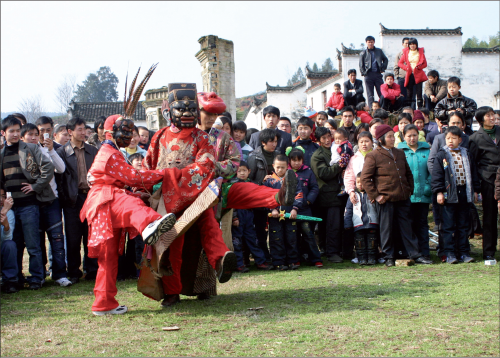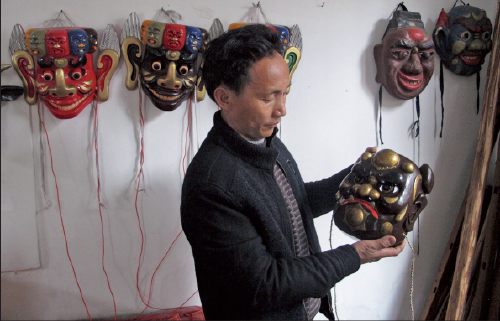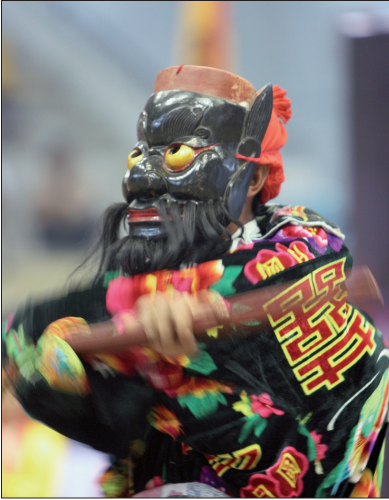
CHINA DAILY
Performances of the 3,000-year-old Nuo Opera are still staged in rural areas in Jiangxi province, thanks to the efforts of generations of inheritors of the art form.

ZHANG ZIXUAN/CHINA DAILY
Cheng Hanping shows one of the antique masks, regarded as sacred artifacts in Nuo Opera.

CHINA DAILY
Nuo Opera has evolved for centuries by blending local music and dance from all over the country.
Zhang Zixuan explores the ancient rites of Nuo Opera as the cultural tradition struggles to survive.
Cheng Hanping spreads an exquisitely embroidered costume upon an iron plate, beneath which Chinese herbal medicines including angelica root are burning to dry any sweat and dampness in the fabric. "The costume draws in the medicine smoke so that it can be folded and stored without attracting worms," says the 46-year-old, standing beside several wood trunks dating from the 1920s. He then hangs several wood-carved and color-painted masks onto the wall, among the hundreds already there. The room, borrowed from a local primary school, is the inheritance base of Wuyuan Nuo Opera.
Cheng is the leader of Wuyuan county's last Nuo Opera troupe. What he and his fellow members perform at Changjing village in Jiangxi province, is a 3,000-year-old primitive religious sacrifice and exorcism ritual.
Originating in the Shang and Zhou dynasties (c. 16th century-256 BC) in China's Central Plain area, Nuo was rooted in totem worship and drew references from Taoism.
In the ages when humans had little understanding of nature, Nuo was once the most powerful and respected ceremony for countering natural disasters, devils and diseases. Ceremonial prayers were petitions for good harvests, longevity and other blessings.
"The masks are the key of the Nuo culture," says Cheng, who has been pursuing the art form for 30 years. "Without masks, we are humans; putting them on, we are spirits and gods."
Cheng carefully safeguards four antique masks, including a gilt-bronze one bestowed by an emperor to one of his predecessors.
Younger-generation inheritors like Cheng worry about money.
"A new wood-carved mask costs 800 yuan ($131); we can't afford to make as many as we need," says the troupe leader, adding that the antique costumes they wear are becoming old and worn but they do not have the money for tailored hand-embroidered new ones.
The masks were once kept in the house of Cheng's senior fellow apprentice Cheng Fu-bao. In 2011, a fire destroyed his entire house, except for the four masks-the first and only objects the elder Cheng rescued.
"Unlike Western Halloween, the Nuo masks are sacred artifacts that have nothing to do with entertainment," says China Nuo Opera Research Institute's deputy director Wu Yunming.
The institute was founded in 1988 to preserve the culture of Nuo. More than 10 international symposiums on Nuo Opera have been held and about 20 volumes of books and paper compilations have been published.
Nuo performers-like Cheng-were celebrated for their knowledge, and they enjoyed the highest status in the village, Wu adds.
Passed down by family or by troupe, Nuo evolved over thousands of years and spread all over China and neighboring countries such as Japan and Vietnam. Integrating with local customs and developing diversified forms, it borrowed music and percussion accompaniment from other Chinese operas during the Ming (1368-1644) and Qing (1644-1911) dynasties.
In Guizhou's Dejiang, for example, the Han-origin Nuo Opera is now performed by the Tujia people with strong Tujia-flavor singing; the more renowned Dixi Opera in Gui-zhou's Anshun, meanwhile, was actually a branch of the Nuo Opera.
Each of the 23 traditional plays (formerly 24) of Wuyuan Nuo Opera lasts from a few minutes to 20 minutes, Cheng says. They are mainly historic and mythical stories, so that roles range from gods and ancient heroes to animal ghosts. Every main figure has a unique mask.
Although played by men, there are also two female roles in Wuyuan Nuo Opera. The feminine characteristics are indicated by the masks, vocals and gestures, Cheng continues.
Three strict rules are followed by the troupe to this day:
A god-worshiping ceremony must be conducted before using any new stage;
A wooden figure representing the originator of the opera must be carried along wherever the troupe performs;
No props are allowed to be touched by anyone outside the troupe, especially women.
However, the opera's former glory can hardly be restored today.
In Jiangxi, Nuo Opera has only survived in three counties. In Nanfeng, the more than 120 troupes of the opera's heyday have shrunk to half that number. Almost all of the antique masks within the county were destroyed in campaigns against superstition since 1949.
"The reason to preserve Nuo Opera is not to advocate superstition, but to preserve a living fossil from a cultural context," stresses Wu of the research institute. "The heritage cannot possibly live for another 200 years if we let it be consumed by modern life and do nothing."
The year before last, Cheng Hanping took three apprentices, all in their early 30s, from the village. He is also teaching primary school students some general knowledge of Nuo Opera.
Wuyuan state-level inheritor Hu Zhenkun-Cheng's teacher-passed away in 2007. At 81, state-level inheritor Cheng Changqing worries about his age.
"I can still dance but I'm too old to sing," he says. "But I still have so much that I haven't taught."
Contact the writer at zhangzixuan@chinadaily.com.cn
We recommend:
